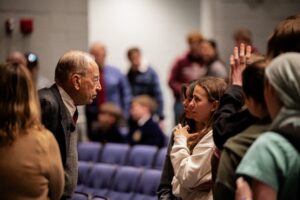A Reflection from Oskaloosa High School Visit to Capitol Hill

Iowa Senator Chuck Grassley spoke with Oskaloosa High School Students this week at George Daily Auditorium.
Photo by Reed Peterson, Oskaloosa High School Student
Senator Chuck Grassley, an Iowa Republican with decades of service, continues to show his commitment to addressing a range of pressing national issues, from health care to human trafficking. He also engages directly with the younger generation, as evident in his recent visit to Oskaloosa High School.
During a session with Oskaloosa High School students, Grassley shared insights into his political journey, offered details about internship opportunities in his office, and answered various questions on topics including agriculture, national security, and social media regulation.
“I’m here to answer questions, not to give a speech,” Grassley emphasized.
He introduced his Washington D.C. office internship program, which is designed to offer real-world governmental experience. The program, open to students post-high school, includes positions across fall, spring, and summer semesters, accommodating around 25 to 30 interns annually.
Senator Grassley proudly noted that two-thirds of his staff were once interns, illustrating the program’s potential as a stepping stone to a public service or government career. “You get to have a real job, something to put on your resume,” Grassley stated, highlighting the tangible benefits of the internship.
Applications for the internship are reviewed on a rolling basis, with positions available in multiple locations, including Cedar Rapids, Council Bluffs, and the nation’s capital, among others. This flexibility ensures that students from all walks of life can access this invaluable experience, regardless of their academic or professional background.
Grassley, a seasoned senator with a long tenure, highlighted a significant evolution in the Senate’s schedule. He emphasizes a more condensed workweek that limits the Senate’s ability to address complex legislative matters. This change, he suggests, reflects both leadership styles and broader trends over time.
Grassley, now serving his eighth term, didn’t just reflect on the mechanics of Senate operations but delved into the deep-seated issue of political polarization. He reminisced about a time when the political landscape was less divided and expressed concern over the current state of ideological division that threatens the legislative process and governance as a whole.
Regarding social media and an app that many young people use, TikTok shared growing concerns over privacy and national security. Grassley, known for his active presence on platforms like Twitter and Instagram, acknowledged his learning curve with TikTok, inviting corrections and insights from his young audience.
Grassley referenced a bill that recently passed the House of Representatives with a significant margin, emphasizing the bipartisan concern over the potential for personal data to compromise national security.
“And she [student] is bringing up a bill that passed the House of Representatives. And I think the reason it passed the House is fear that the data they collect on you personally, maybe that’s not as big of a thing if you don’t mind if your privacy is being compromised. But much information could be gotten that would compromise national security,” Grassley explained.
The heart of Grassley’s concern lies in the possibility of sensitive information falling into the hands of foreign adversaries, particularly China. He underscored the primary duty of the federal government to protect national security and, by extension, the American people from potential threats.
“We don’t want China to have information about our national security. And, so we would want that to be protected,” the senator asserted. He detailed the bill’s provisions, which wouldn’t ban TikTok but would require its sale to an American company, safeguarding all collected data from ending up in Beijing.
Recounting how politics became a part of his life, Grassley shared a story about those first days.
Grassley was raised on a small farm, and his political aspirations were nurtured not through his parents’ active participation in politics but through their regular discussions about history and government. “My mom and dad were small farmers. They probably didn’t do much more than vote. They weren’t involved in the Republican Party, although I believe they were Republican. But for some reason or other, they were always talking about history and government at our kitchen table,” Grassley told the students.
This environment of curiosity and discussion laid the foundation for Grassley’s interest in government, which he pursued academically with a degree in teaching. “I was either going to be in elective office, or I was going to be teaching government,” Grassley said.
However, life had other plans for Grassley. His father’s early death in 1960 steered him towards farming, a profession he had not envisioned for himself. Yet, the pull towards politics remained strong, and Grassley soon found himself elected to the state legislature, a pivotal moment that marked the beginning of his political career.
During the session, Grassley encouraged the students to embrace opportunities and be open to where life might lead them. “I wouldn’t even know that I was going to get elected to the legislature until you try it,” he stated, emphasizing the importance of taking chances and the unpredictable journey to achieving one’s goals.
According to Grassley, the significant challenges facing the legislative process today stem primarily from within the House of Representatives and, more specifically, within the Republican Party. “It seems to me that most of the problem is within the Republican Party in the House of Representatives. They can’t seem to stick together. They can’t govern. And that’s a sad situation,” Grassley lamented.
Highlighting the importance of media in democracy, Grassley criticized the current trend of advocacy journalism, arguing that it detracts from the media’s fundamental role as unbiased watchdogs of the political system. “Journalists [should] be the policemen of our political system that they’re supposed to be, not to be advocates. But to be unbiased people reporting on the news,” Grassley urged. He emphasized that when journalists adopt a partisan stance, they fail to fulfill their duty to keep the government accountable and politicians honest.
Grassley passionately argued that this shift towards partisan journalism has contributed significantly to the public’s growing cynicism towards government, mainly because it portrays an image of constant conflict and discord among politicians, overshadowing instances of cooperation and bipartisanship. He shared a personal anecdote to illustrate his point: “Durbin, the Democrat whip, and I worked for five years to get some judicial reform legislation passed. You don’t hear anything about the First Step Act. But he and I disagree on immigration, and you’d be apt to read about that.”
“I always like to start an immigration question out with the fact. So you don’t think that we’re all against immigration, about a million people come here every year legally,” Grassley began, underlining the United States’ history of welcoming immigrants from diverse backgrounds.
Grassley’s dialogue with the students brought to light his concerns over illegal immigration and the enforcement of existing laws. “You can’t come to this country without our permission. And that’s been a law for decades and decades,” he remarked, pointing to a perceived enforcement gap under the current administration. Grassley’s advocacy for the rule of law in immigration policy resonates with his legislative priorities, reflecting a broader Republican viewpoint on strengthening border security to combat illegal entry.
The senator cited international examples of physical barriers between countries, such as those between the Dominican Republic and Haiti, Israel, and Palestine, and Poland and Belarus, to bolster his argument for the efficacy of walls in controlling migration. “And people say fences don’t work. So we ought to finish the fence,” Grassley asserted, advocating for the completion of border wall projects to deter illegal crossings.
In his closing remarks, Grassley emphasized the need for a balanced approach that respects the law while recognizing the humanitarian aspects of immigration. “Enforce the law,” he advised.
The stop at George Daily Auditorium was part of Senator Grassley’s 99-county tour that he does annually.












